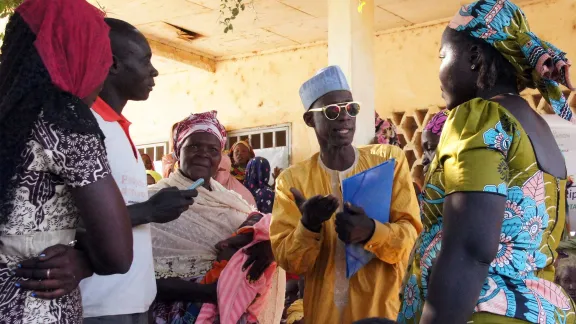
Villagers in the Lake Chad region raise awareness about the dangers of early marriage in a play. Photo: LWF/ C. Kästner-Meyer
Empowering women, strengthening communities
(LWI) - Climate change impacts communities on multiple levels, and projects to build resilience therefore need to address the problem in a holistic way. A climate change adaptation project of the Lutheran World Federation (LWF) and Canadian partners in the Lake Chad region is not only conceptualized for a regional approach across the Cameroon-Chad border but also addresses the impact on climate change on many levels. During a December 2024 field visit, LWF staff could see how LWF’s work builds resilience in local communities.
Flying into the Chadian capital, N’Djamena, the devastation from flooding is starkly visible. Six months after the waters receded, some homes remain surrounded by water. Along main roads, toppled lamp posts—washed away from their foundations—stand as haunting reminders of the disaster’s scale.
Since July 2024, Central and West Africa have been heavily affected by flooding, caused by heavy rain and strong wind. The Lake Chad region is among those that were hit hardest. According to UN figures, 2.4 million people in Chad and Cameroon have been affected directly. Hundreds lost their lives. The water destroyed 274,000 homes and displaced 160,000 people. Even more, the water destroyed farmland and killed livestock, leaving more than 3 million people in Chad food insecure for the lean season.
Climate Change fuels conflict
The Lake Chad basin faces multiple, interwoven crises. Rising temperatures, deforestation, and illegal logging have accelerated soil erosion and degraded ecosystems. These environmental pressures, compounded by frequent droughts, floods, and attacks by extremist groups like Boko Haram, have displaced entire villages and left communities vulnerable.
“The water has taken away what little source of income people had: farmland and livestock,” says Anaïdjo Avada, president of the peace committee in Logone-Birni, Cameroon. Damaged roads and bridges limit mobility, leaving families unable to seek work or basic services. Many displaced people face a severe lack of shelter and livelihood options, putting additional strain on scarce resources.
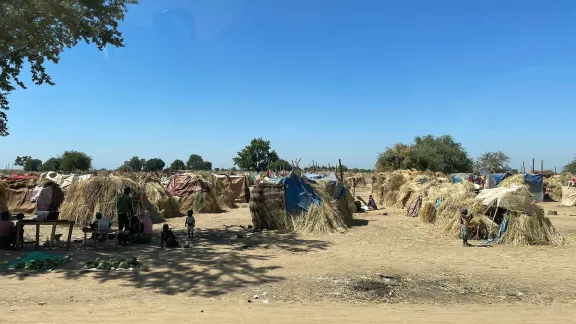
Settlement of people displaced by the floods in summer and fall 2024 in Logone-Birni prefecture. Thousands still live in these provisional grass houses. Photo: LWF/ C. Kästner-Meyer
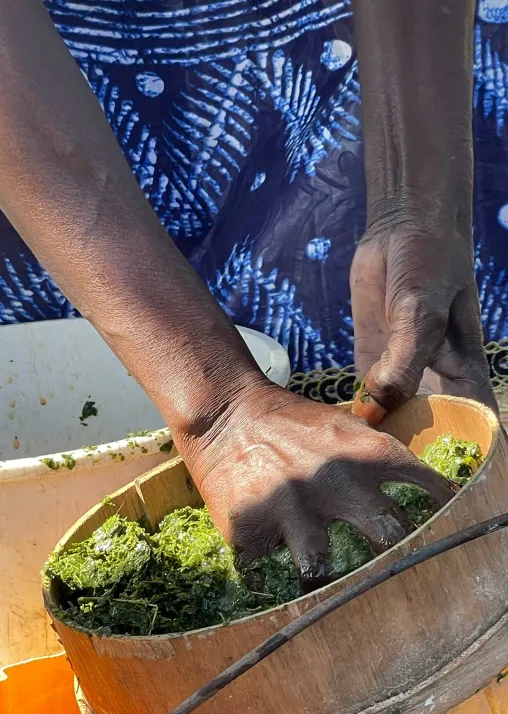
A women demonstrated the production of an insecticide made from local neem trees. Photo: LWF/ C. Kästner-Meyer
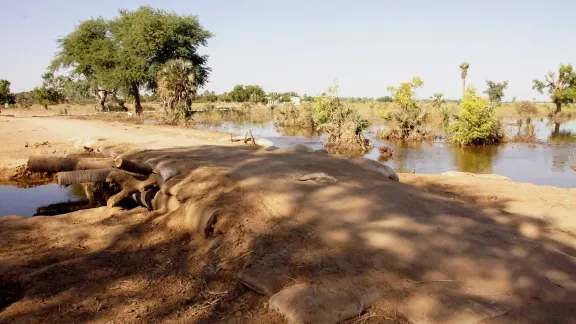
A women demonstrated the production of an insecticide made from local neem trees. Photo: LWF/ C. Kästner-Meyer
“The water has taken away what little source of income people had: farmland and livestock,” says Anaïdjo Avada, president of the peace committee in Logone-Birni, Cameroon. Damaged roads and bridges limit mobility, leaving families unable to seek work or basic services. Many displaced people face a severe lack of shelter and livelihood options, putting additional strain on scarce resources.
The situation fuels inter-community conflicts and domestic violence, A. Avada adds. Neighbors argue over the remaining harvest, fishing grounds, and access to fertile land. Couples argue over how to make ends meet. “As floods occur more frequently, conflicts increase.”
A comprehensive approach
LWF’s three-year project addresses these challenges holistically, combining five nature-based solutions—conservative agriculture, climate-sensitive livelihoods, water management, reforestation and assisted natural regeneration, and sustainable fishing—with governance, peacebuilding and gender justice initiatives. Communities are trained in conflict resolution, and responsible governance. The peacebuilding group that Avada presides over brings together community leaders and local authorities, including religious leaders. They prevent and mediate conflicts in the community and regularly meet to address upcoming challenges.
About one-third of the peacebuilding group are women, and they are quite open in talking about their challenges. “We see that women often bear the brunt of resource scarcity,” notes Kaka Yousouf, president of the local gender-based violence prevention group. She explains how disasters like the recent floods affect women more than men. As much field and household work is done by women, they must work harder to make ends meet, they eat last and less than family members. Girls are sometimes married off young so their families can receive a dowry and no longer have to provide for them.
The women in Yousouf’s group have launched an organic tomato plantation, which provides income managed by the women. They use it to help those in vulnerable situations. “We’ve supported 40 orphan girls through school,” Yousouf shares. The group also assists with medical bills and weddings. Yousouf collaborates with local leaders, including imams, to combat early and forced marriages. In the long run, the project aims for more economic empowerment of women.
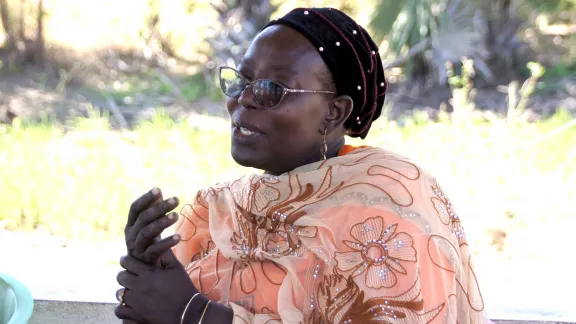
Kaka Yousouf, president of the Association against gender-based violence in Logone-Birni. Photo: LWF/ C. Kästner
The floods are a disaster, and there is nothing we can do to stop them. We must learn to live with this reality.
Kaka YOUSOUF, president of the association against gender-based violence
Partnering with Communities
LWF builds on local resources and community-driven solutions. As floods have become a recurring phenomenon, many farmers have adapted by shifting to wetland cultivation, planting rice in flooded areas, and LWF supports these solutions. “The floods are a disaster, and there is nothing we can do to stop them,” says Kaka Yousouf. “We must learn to live with this reality.”
Responding to emergencies like the summer 2024 floods however requires additional resources, says Ngolsou Keting, LWF Chad Country Representative. “This is a significant challenge. Flooding now occurs every two years. We are exploring partnerships to address immediate humanitarian needs while building long-term resilience.”
Anaïdjo Avada agrees:“When two neighbors argue over a poor harvest, we can mediate,” he says. “But it is harder to solve a problem when you are hungry.”
The project “Climate change adaptation based on a gender transformative approach” is funded by Global Affairs Canada and Canadian Lutheran World Relief (CLWR) and implemented by the LWF country programs in Cameroon and Chad. With a budget of 9.5 million EUR over three years, it indirectly benefits more than half a million people.
Together with the Evangelical Lutheran Church in America, LWF has begun preparing communities for natural disasters, equipping them to reduce the impact of such crises.


